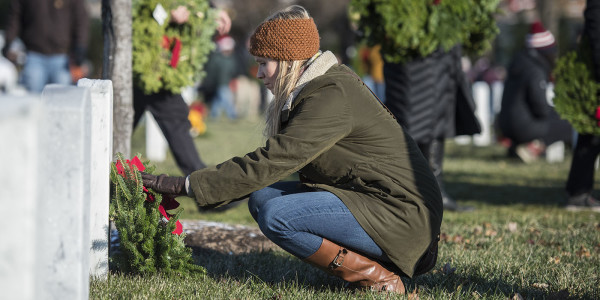

It’s official: The holidays are here. This week, families will gather to share in the sights, sounds, and tastes of Christmas, along with the hustle and bustle of decorations, gifts, and holiday parties.
But for families and friends of America’s fallen military heroes, the holidays can be tougher. There’s an empty chair at the table. The holiday photos and postcards are missing an important member of the family. While everyone else seems full of joy, relatives and battle buddies of the dead often go through the motions of the holidays, but without any of the cheer.
If you have lost a relation or buddy during their military service, it’s important to remember that joy doesn’t belong just to families that are still intact. I have had to learn this firsthand throughout the years that followed the death of my husband. Weeks before Thanksgiving in 1992, I lost him in an Army plane crash in Alaska, along with seven other soldiers. I spent the holidays that year in a fog of grief. But I learned that you can find ways to cope — and not just to muddle through, but to eventually even enjoy the holiday season again. Here are a few tips from someone who has been there.

Lt. Col. Wade Workman presents the flag of Maj. R. Sterling Norton, a fallen pilot with Marine Fighter Attack Squadron (VMFA) 232, to his wife during his funeral ceremony at the Miramar National Cemetery, San Diego, August 12, 2016.U.S. Marine Corps/Sgt. Lillian Stephens
1. Make a plan.
In my experience, the anticipation is frequently worse than the holiday itself. It’s far better to have a plan than to try to go without one. Try to think about what will give you the best chance to remember your loved one and bring you some peace. Talk with the people who normally share the holidays with you, asking them for their understanding if you need to cancel at the last minute. Consider accepting an invitation even if you don’t feel like it. You might be surprised how everything unfolds when you get there. And if you are feeling uncomfortable, you can always politely leave.
2. Create new traditions.
You may want to evaluate the holiday traditions you’ve established over the years. Are there some you’d like to keep because they’re meaningful? Are some no longer useful? Are there others you’d like to maybe change or revisit in the future due to this year’s circumstances? You can even go somewhere new and different: If you live where it is cold and snowy, you can go somewhere warm and sunny. That type of change might be just right for you.
3. Allow others to help.
Our holiday memories can be especially vivid, making the season a difficult time to be alone. You can benefit from being around others who love and understand you; often, people in our circle of family and friends need to help us as they work through their own grief. Of course, many people won’t understand what you need most, so you may have to kindly let them know how they can help.
4. Allow yourself to help others.
There’s a saying that it’s better to give than to receive, which also applies to those working through grief. I cannot tell you how many people I have talked with who said that volunteering as a mentor or in some other capacity literally saved their life. So go out and find just one thing you can do for someone else this holiday season. I guarantee it will help you feel just a little bit better.
5. Be kind to yourself.
It’s easy to take on too much during the holidays, even for people not grieving the loss of a loved one. These stresses are only magnified by grief. Avoid taking on too much and commit only to what you have the energy to handle. Give yourself time to rest, as well as some grace on the “bad days,” because you know you will have them. Good self-care is one of the best gifts you can give yourself.
Above all, remember the love. Our relationships with our loved ones do not end at death, they just change. We carry on their life and legacy, during the holidays and every other day of the year. This season, let’s honor them by seeking the joy they would have wished for us.
Bonnie Carroll is president and founder of the Tragedy Assistance Program for Survivors and was awarded the Presidential Medal of Freedom in 2015. She retired from the Air Force Reserve in 2012 after 30 years of service. Since 1994, TAPS has provided compassionate care for the families of America’s fallen military heroes and has offered support to more than 70,000 surviving family members and their caregivers. Anyone grieving the loss of a military loved one who needs support this holiday or any day can call our 24/7 Helpline at 800-959-TAPS (8277).
